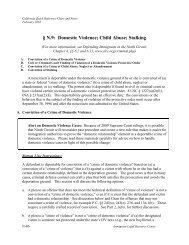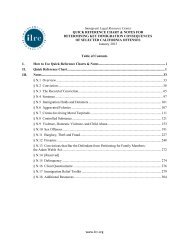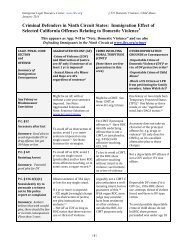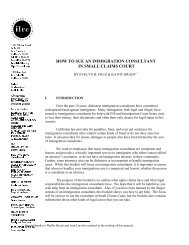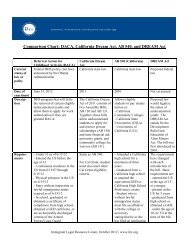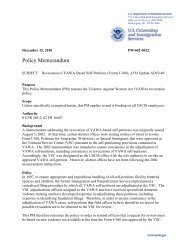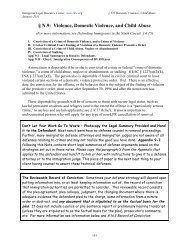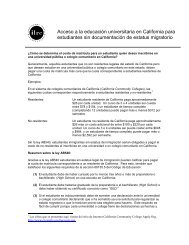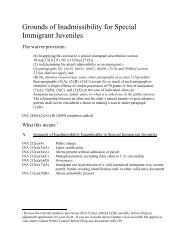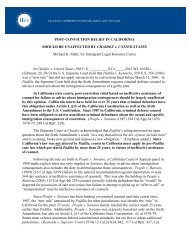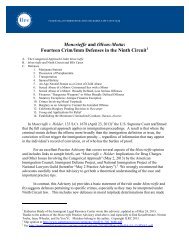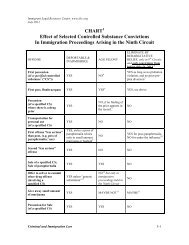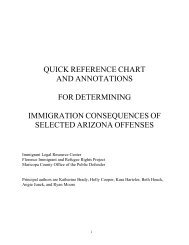quick reference chart and notes for determining immigration - ILRC
quick reference chart and notes for determining immigration - ILRC
quick reference chart and notes for determining immigration - ILRC
Create successful ePaper yourself
Turn your PDF publications into a flip-book with our unique Google optimized e-Paper software.
Cali<strong>for</strong>nia Quick Reference Chart <strong>and</strong> Notes<br />
February 2010<br />
The definition of theft <strong>for</strong> aggravated felony purposes is “a taking of property or an<br />
exercise of control over property without consent with the criminal intent to deprive the owner of<br />
rights <strong>and</strong> benefits of ownership even if such deprivation is less than total or permanent.” 186<br />
This definition does not include fraud, embezzlement, or other offenses committed by deceit as<br />
opposed to stealth.<br />
Temporary taking, Veh. Code § 10851 <strong>and</strong> accessory after the fact. The aggravated<br />
felony definition of theft includes a permanent or temporary taking. (Compare to the moral<br />
turpitude definition of theft, below, which only includes a permanent taking). Thus the act of<br />
taking a vehicle as described in Calif. Veh. Code § 10851 is a “theft” <strong>for</strong> this purposes, despite<br />
the fact that it does not require intent to permanently deprive the owner. 187 Note, however that in<br />
United States v. Vidal the Ninth Circuit en banc held that § 10851 still is divisible as “theft.”<br />
Because the court found that § 10851 includes accessory after the fact, <strong>and</strong> because that offense<br />
is not a theft, the court found that § 10851 is divisible as “theft” as long as the record does not<br />
establish that the defendant acted as the principal rather than as an accessory after the fact. 188<br />
Thus a plea to § 10851, even with a sentence of a year imposed, will not be held to be an<br />
aggravated felony if the record of conviction does not establish that the defendant was found<br />
guilty as principal rather than accessory after the fact. However, counsel still should do<br />
everything possible to avoid a one-year sentence. Several judges dissented from the en banc<br />
ruling in Vidal on the grounds that accessory after the fact cannot reasonably be held to be an<br />
offense described in § 10851, <strong>and</strong> it is possible that the Supreme Court would review the issue<br />
Early in 2007 the Supreme Court dismissed a similar but much weaker argument concerning<br />
aiding <strong>and</strong> abetting. 189<br />
Theft of services <strong>and</strong> P.C. § 484. The definition of “theft” is limited to theft of<br />
property. Since P.C. § 484 includes theft of labor, it is a divisible statute <strong>for</strong> aggravated felony<br />
purposes. 190 If the record of conviction somehow is kept vague between theft of labor <strong>and</strong> other<br />
theft, the offense is not an aggravated felony as theft. Cali<strong>for</strong>nia law expressly permits the<br />
prosecution to charge Cali<strong>for</strong>nia offenses in the language of the statute. Section 952 of the<br />
Cali<strong>for</strong>nia Penal Code provides that “[The charge] may be in the words of the enactment<br />
describing the offense or declaring the matter to be a public offense, or in any words sufficient to<br />
give the accused notice of the offense of which he is accused. In charging theft it shall be<br />
sufficient to allege that the defendant unlawfully took the labor or property of another.”<br />
(emphasis supplied)<br />
186 United States v. Corona-Sanchez, 291 F.3d 1201, 1205 (9 th Cir. 2002)(en banc). The Supreme Court approved<br />
this definition. Gonzales v. Duenas-Alvarez, 127 S.Ct. 815, 820 (2007).<br />
187 Gonzales v. Duenas-Alvarez, id.; Matter of V-Z-S-, Int. Dec. 3434 (BIA 2000).<br />
188 United States v. Vidal, 504 F.3d 1072, 1087 (9 th Cir. 2007)(en banc), holding that Calif. Veh. Code §10851 is a<br />
divisible statute as a “theft” aggravated felony because it includes the offense of accessory after the fact, <strong>and</strong> the<br />
record did not establish that the conviction at issue was not <strong>for</strong> accessory after the fact.<br />
189 Duenas-Alvarez, supra.<br />
190 United States v. Corona-Sanchez, 291 F.3d 1201 (9 th Cir. 2002)(en banc). See also Duenas-Alvarez, supra at<br />
820, acknowledging widespread use of definition of theft as exerting control over property.<br />
N-114 Immigrant Legal Resource Center



